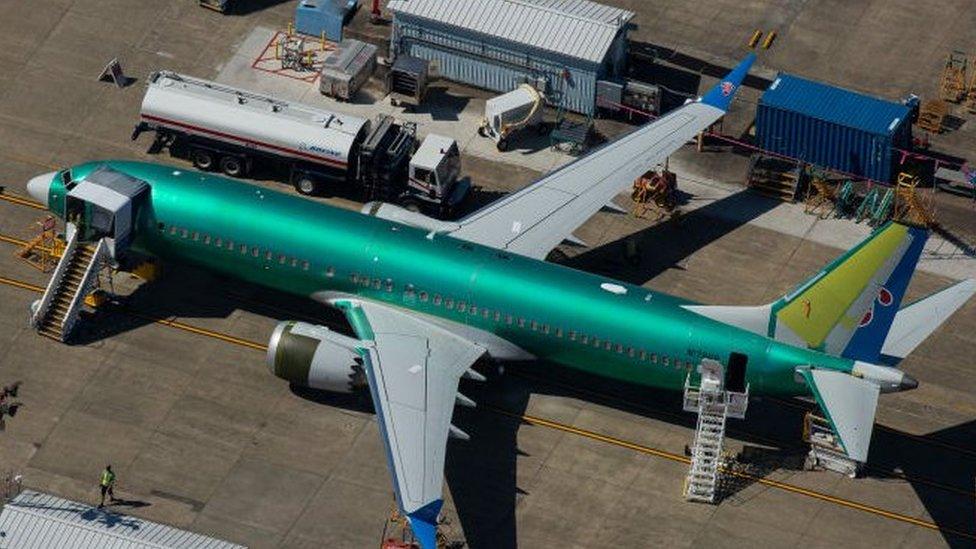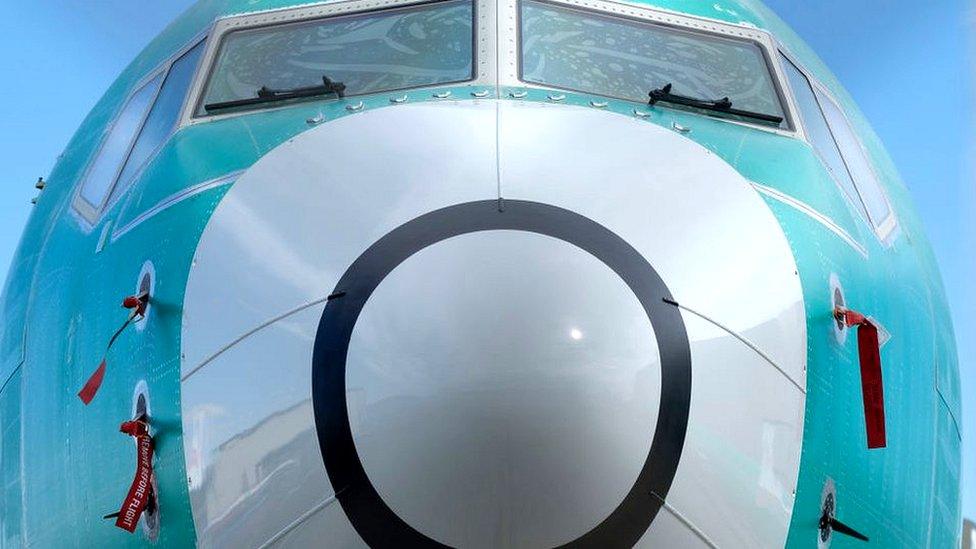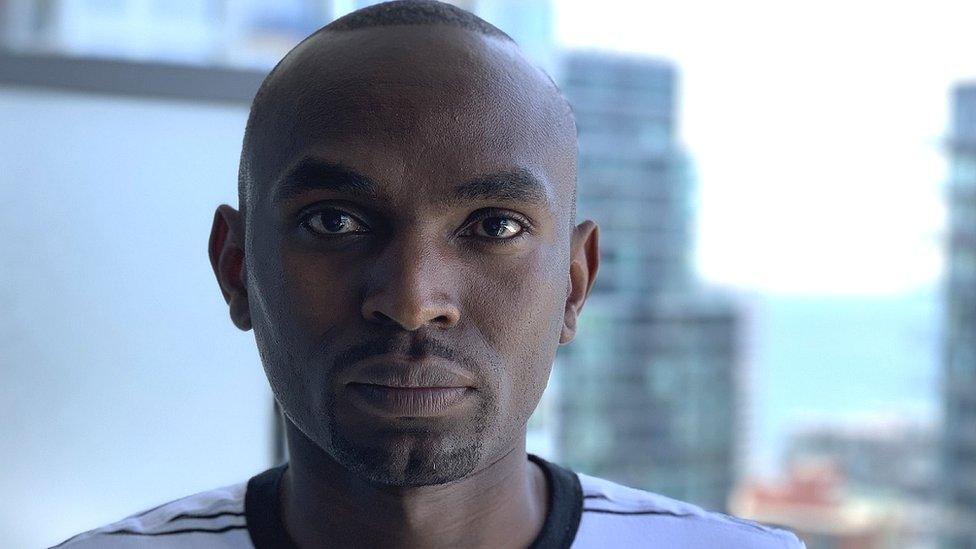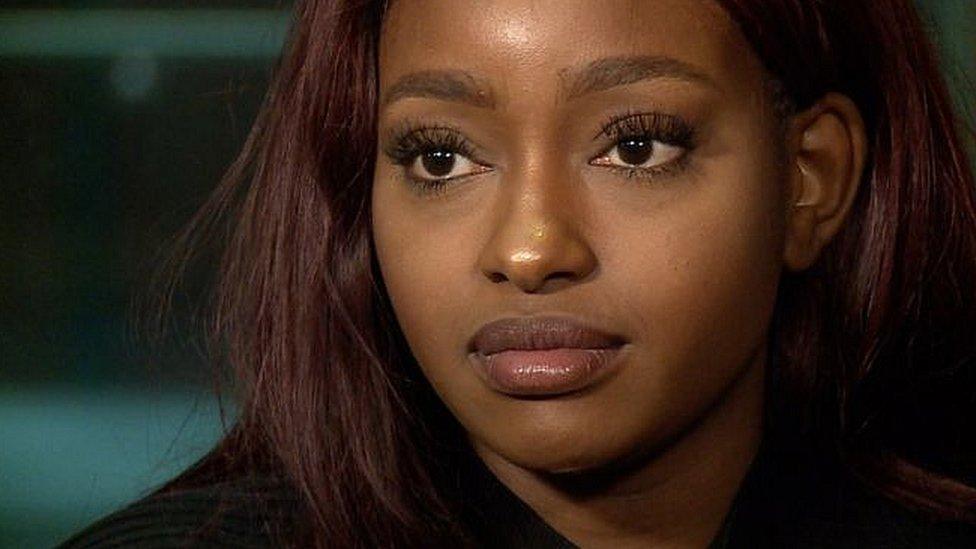Boeing faces fine for 737 Max plane 'designed by clowns'
- Published

US regulators are seeking to fine Boeing $5.4m (£4.14m) for "knowingly" installing faulty parts on 737 Max planes.
The move comes after the release of internal messages that raised more questions about the jet's safety.
In one of the communications, an employee said the plane was "designed by clowns".
Boeing has been under scrutiny since the fatal crashes of two 737 Max planes, which killed 346 people.
The fine announced by the Federal Aviation Administration (FAA) on Friday is not connected to the software system that investigators have implicated in those crashes.
It concerns "slat tracks" that are located on the wings.
The FAA said the company submitted the jets for FAA approval despite determining that the wing parts had failed a strength test. It also accused Boeing of failing to oversee its suppliers properly.
The planemaker has the right to contest the penalty, which follows a $3.9m fine the FAA proposed against the US aerospace giant for similar reasons last month.
Boeing did not immediately respond to a request for comment.
The announcement heightens the pressure on the company, which is now facing multiple investigations following the 737 Max crashes in Indonesia and Ethiopia.
Last month, the company fired chief executive Dennis Muilenburg. The firm said Friday it had denied him severance and that he had forfeited stock awards worth about $14.6m.
As part of the investigations, Boeing has provided hundreds of messages to the FAA and Congress. It said it had released redacted versions this week as part of its commitment to transparency.
"These communications do not reflect the company we are and need to be, and they are completely unacceptable," Boeing said.
Simulator pushback
In one exchange in April 2017, an unnamed employee wrote: "This airplane is designed by clowns who in turn are supervised by monkeys."
The documents, external also showed Boeing planning to push back against requirements that 737 Max pilots receive training on simulators, which would have led to higher costs for its customers, making its aircraft less attractive.
"I want to stress the importance of holding firm that there will not be any type of simulator training required to transition from NG to Max," Boeing's 737 chief technical pilot at the time, Mark Forkner, said in a March 2017 email.
"Boeing will not allow that to happen. We'll go face to face with any regulator who tries to make that a requirement."
On Tuesday this week, Boeing reversed its position by recommending 737 Max simulator training, external for all pilots.


These messages refer to Boeing employees telling lies, covering up problems and treating regulators with contempt.
They reinforce the impression - already expressed vividly by whistleblowers and in Congressional hearings - that Boeing was a company that had lost its way, focused on maximising production and keeping costs down, rather than on safety.
Will all this actually harm Boeing though? It's questionable.
The company's reputation has already been savaged; it may be calculating that it now has little to lose by being transparent about past failures.
But it is easy to see now why the relationship between Boeing and the Federal Aviation Administration has deteriorated so far - and why the recertification of the 737 Max has taken so long.

Staff also appear to discuss problems with the simulators.
In February 2018, a Boeing worker asked a colleague: "Would you put your family on a Max simulator-trained aircraft? I wouldn't."
"No," came the reply.
Economic cost
Boeing has said it is redesigning the automated control system thought to have been the primary cause of the crashes.
But 737 Max planes have been grounded worldwide since March and with no sign from regulators that the aircraft will be re-approved for flight anytime soon, the firm has been forced to halt production of the planes.
On Friday, the economic costs started to be felt as Spirit Aerosystems, a major Boeing supplier, said it would cut 2,800 jobs at a plant in Kansas, and expected smaller layoffs at some of its other factories.
"Spirit is taking this action because of the 737 MAX production suspension and ongoing uncertainty regarding the timing of when production will resume and the level of production when it does resume," the company said in a statement, which noted that Boeing has hundreds of 737 planes in storage.

Timeline: Boeing crashes
29 October 2018: A 737 Max 8 operated by Lion Air crashes after leaving Indonesia, killing all 189 people on board
31 January 2019: Boeing reports an order of 5,011 Max planes from 79 customers
10 March 2019: A 737 Max 8 operated by Ethiopian Airlines crashes, killing all 157 people on board
14 March 2019: Boeing grounds entire 737 Max aircraft fleet

The FAA said of the emails that safety problems had been addressed.
However, the regulator added: "The tone and content of some of the language contained in the documents is disappointing."
'Covering up'
In the emails and instant messages, employees spoke of their frustration with the company's culture, complaining about the drive to find the cheapest suppliers and "impossible schedules".
"I don't know how to fix these things... it's systemic. It's culture. It's the fact we have a senior leadership team that understand very little about the business and yet are driving us to certain objectives," said an employee in an email dated June 2018.
And in a May 2018 message, an unnamed Boeing employee said: "I still haven't been forgiven by God for the covering up I did last year."
Without citing what was covered up, the employee added: "Can't do it one more time, the pearly gates will be closed."
Boeing said that some of the messages "raise questions" about the company's interactions with the FAA in discussions about the simulator.
But the company dismissed safety concerns, saying that the issues raised in the emails occurred at the start of the simulators.
It said: "We remain confident in the regulatory process for qualifying these simulators."
- Published11 December 2019

- Published5 July 2019

- Published19 December 2019
